Laura Montgomery
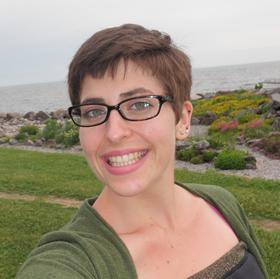
At Lakehead, Laura Montgomery is now excelling in a discipline which has captured her passion since high school. As a graduate student in social work, she has found her field to be challenging, rewarding, and a profession of many paths, offering a wide range of opportunities.
To explore this plethora of options, Montgomery chose to complete her studies through the "advanced generalist focus". She explains that this unique focus is not only a great fit for prospective social workers but also serves to broaden the knowledge and skillset of students who have already decided upon a direction.
"It is a program that caters to the individual's needs," she explains. Montgomery adds that being able to direct your own graduate experience is both stimulating and gratifying, thereby a definite strength of Lakehead's MSW program.
After exploring several topics of interest, Montgomery opted to devote most of her time in the program to the subdisciplines of advocacy in adult mental health and Aboriginal child welfare in addition to several social justice projects. Also, as a research assistant for her department, she's explored different ways of promoting the inclusion and acceptance of individuals with disabilities and combatting "ableism". In fact, she's had the opportunity to contribute to multiple research teams and found her experience working on a dual site research project to be particularly "fascinating", during which she was able to collaborate with researchers from other universities.
Overall, Montgomery commends her graduate program for empowering her to "to think critically, grow professionally, and research ethically." Her graduate experience has also afforded her with many options; now armed with a well-rounded skillset and knowledge base, Montgomery has the luxury of deciding between a life of academia or entry into professional practice following graduation. She adds that her professors have been extraordinarily supportive throughout her degree: "The faculty are dedicated to your educational evolution and passion."
Dr. David Tranter
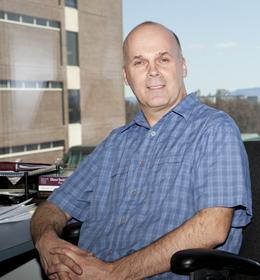
The field of social work is anything but confined.
Before coming to Lakehead, Dr. David Tranter worked in a range of settings with children, families and couples, homeless persons, individuals with psychiatric disabilities, and survivors of sexual abuse. Now as an academic, his myriad of research directions includes personal and social change, differences and conflict in relationships, community engagement and development, and youth recreation and leadership.
To facilitate research in the community, he's developed an initiative called "adopt an agency", through which himself and his students partner with an agency each year to pursue a project. Recently, students had an opportunity to work with the United Way, examine the impact of the City of Thunder Bay's Positive Recreation Opportunities for Kids Program, and help out with AIDS Thunder Bay's Engaging Populations at Risk study.
Dr. Tranter also recently travelled with his students to a ten-day study tour in Cuba. Sponsored by the Cuban Women's Federation, the group had an opportunity to visit the local inner-city artist program, explore the Paola Freire Institute, and attend a children's music program at the Karl Marx Theatre. Dr. Tranter reflects that for all involved, it was the trip of a lifetime. "All of my graduate students said it was the single most powerful and educational experience that they have ever had."
What separates Lakehead's MSW from all others?
Dr. Tranter believes it to be the close working relationships with professors and the program's flexibility. "We are able to sit down with each student, talk at length about their interests and aspirations, and develop with them a graduate experience that really meets their needs." As an example, when students expressed an interest in development work in Africa, not only were they able to complete a lot of related coursework - they were also able to travel to Africa to complete their practicum and research.
Dr. Tranter adds that while his graduates find work locally as well as around the world, they're all actively contributing towards enhancing quality of life. "The graduate students that I have worked with have readily found interesting and meaningful jobs within the profession and are truly doing work that gives them a sense of purpose and contribution."
Ryan Garnett
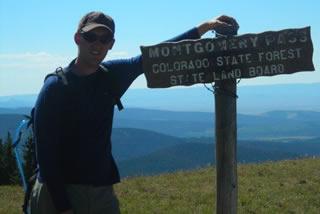
Outdoor recreation graduate Ryan Garnett has a pretty impressive resume.
A few of his career highlights include creating flight simulators for the military in Ottawa and heading a natural resources department in Corner Brooke. Later on, he was summoned to Colorado where he worked on 3D projects in places like China, India, Ireland, United States and travelled internationally to manage and facilitate their progress.
Recently, he settled down for a few years to complete his master's in environmental studies at Lakehead and take the next step in his exciting and highly marketable career. Now graduated, his research examined the perceptions of wilderness; how people experience wilderness and what impacts their perceptions.
His thesis had a unique twist; not only did his research look at the issue from a Canadian context, but it also incorporated a spatial standpoint and a 3D perspective. As such Garnett was able to apply his expertise in 3D visualization and explains that wilderness perception mapping, traditionally carried out in 2D, can be enhanced by another dimension. "The third dimension provides much more of an impact than the second dimension and very different results that can be used for management purposes."
Garnett has enjoyed his research and is enthusiastic about its potential to assist planning and management within existing and proposed protected areas. He's also enjoyed Thunder Bay's rich outdoors scene as an avid fly fisher, skier, and whitewater paddler.
And with his unique skillset, Garnett's been kept well-employed by the university. He currently works to bring in consulting and contracting work and also helps out with students, works on his own government-funded research, and runs the fully-digitalized research data centre, which he helped to develop from the former map library.
With his eyes on a doctorate, he recently received a fully-funded PhD offer from Western University in wetland health assessment using spatial analysis and satellite imagery. He is also considering several programs throughout North America and Europe.
Dr. Helle Møller
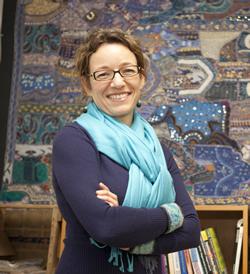
From nursing in Denmark to studying tuberculosis in Nunavut to researching and teaching in Greenland, Dr. Helle Møller's life has been anything but boring. Throughout these many adventures, she has actively contributed towards furthering health knowledge and practice - and continues to do so within Lakehead's public health program as a professor and graduate supervisor.
Originally from Denmark where she began her health career as a nurse, Dr. Møller moved to Nunavut to continue her practice and found the experience to be stimulating yet highly challenging. "During this work, I realized the shortcomings of my own education when caring for populations from different ethnic, cultural, linguistic, and environmental backgrounds." To inform herself, Dr. Møller started to take a few anthropology courses and developed a passion for the field and a keen interest in the social determinants of health.
Several years down the road, while Dr. Møller's interests continue to revolve around Arctic health and health education, she now finds herself involved in a diverse line of exciting projects. Through partnerships with the Thunder Bay Research Institute and the Universities of Southern Denmark and Greenland, she has worked to develop more accessible cervical cancer screening and prevention methods for women in Northwestern Ontario and is currently working on a similar project in Greenland.
She's also investigating the influence of early nursing in Nunavut and Greenland on public health today and is presently exploring how the environment impacts the activity level and well being of senior populations in Denmark and Northern Ontario.
Now, as an accomplished nurse, anthropologist, and health researcher, Dr. Møller certainly brings many years of international experience and a multidisciplinary knowledge base and skill set to Lakehead's public health department.
She explains how the MPH program is uniquely diverse and consequently opens doors to numerous employment and research opportunities, all with the potential to make a difference in the health of individuals, communities, and populations. "The program offers a wealth of fantastic courses and dedicated educators with a wide range of experiences and research interests."
Aaron Pearson
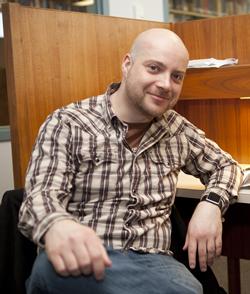
It's difficult to explain mathematics student Aaron Pearson's research in a nutshell...he does study infinity.
More specifically, he's researching the Cantor set, a deceptively simple fractal which challenges mankind's intuitive notions of infinity, measure, and dimension.
And Pearson's thoroughly enjoyed the challenge of undertaking this mind-bending maze of inquiry. He also finds his research to be highly inspiring: "The idea of something having a measure of 0, yet still being uncountable, caught my imagination from early on. I just found it so cool."
The opportunity to delve beyond infinity is a definite positive of his program. However, Pearson affirms that he primarily pursued his studies at Lakehead for the people. "The professors here want you to do well and they want you to learn; they'll go out of their way to help you."
He also appreciates the math department overall, which maintains a tight-knit community both in and out of class. Pearson recently enjoyed attending the annual Pi Day celebration, in which students and faculty competed in a Pi memorization competition and shared a number of decadent, freshly-baked deserts.
As well, his fellow peers frequently get together to go for coffee, discuss their research, and, as of recent, knit. "It's this meme that has swept through the math department," explains Pearson, who recently took up the art himself. "At one point, we went for coffee and I was the only person at the table without knitting in front of me."
Pearson explains that this highly collaborative and accepting environment provides a perfect setting to research and enjoy mathematics, a place where all "are passionate about the joy of discovery." An aspiring professor, Pearson hopes to eventually pass on his own passion and appreciation for the subject to his future students.
"Why do I study math? It's highly useful; mathematicians create the tools that scientists and engineers use to build things and understand the world. But it's also beautiful, the concepts and revelations are so fascinating ...I can't imagine doing anything else."
Dr. Todd Randall
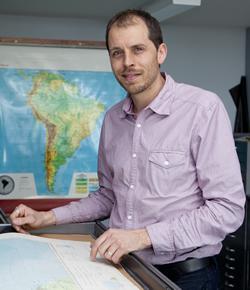
What makes for a strong, healthy city?
Dr. Todd Randall's answer would be sound, sustainable practices.
A Lakehead geography professor and supervisor for the master's in environmental studies program, Dr. Randall's research interests revolve around neighbourhood design and the use of sustainable practices to foster good urban form.
He explains that there are several ways to enhance urban sustainability from incorporating levels of intensification to mixed land use to increasing the accessibility of public transit and/or pedestrian modes of transportation. With research interests ranging from suburban retrofitting to applied geomorphology, he's recently pursued the development of a GIS-based land use diversity model, measured public perceptions of more intensified housing forms, and explored the planning challenges of school closures.
While a large chunk of Dr. Randall's work is carried out within the Thunder Bay community, one of his more "exotic" projects involved conducting a community-based needs assessment for indigenous communities in rural Ecuador. Dr. Randall also spent a sabbatical year in France hosted at the Universite de Toulouse Le Mirail, during which he was able to explore and compare the urban attributes of an older European city to Canadian neighbourhoods.
Dr. Randall's students likewise continue to explore methods of implementing sustainability practices in urban settings. For aspiring graduates in the area, Dr. Randall recommends such research topics as school closures in northwestern Ontario, the use of green infrastructure and technology to improve community sustainability and resiliency, and the investigation of urban planning practices for less auto-dependent neighbourhoods.
What with over half of the world's population living in cities, research like Dr. Randall's is working to fulfill a global need for human populations to live more sustainably. His projects also empower those living in urban areas by making their neighbourhoods stronger and healthier. "My continuing interests are to refine ways of measuring and implementing more sustainable places at a variety of scales...the projects I pursue often lead to outcomes that have a very tangible benefit to communities who enjoy a greener and more self-sufficient place of residence."
Heather Cameron
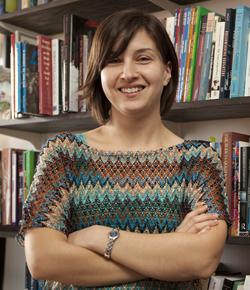
Sociology student Heather Cameron is investigating a practice that is difficult for many to fathom: a recent social movement trend towards unassisted childbirth, the delivering of an infant without the help of medical professionals. Looking through the lens of feminist and critical health theory, Cameron is trying to comprehend how ideas of risk surrounding this concept are socially constructed and framed by different stakeholders.
Cameron explains that she's mainly interested in the topic because it falls so outside the norms when it comes to birth-related decisions. "I find a lot of people can't even begin to think about just staying at home to have their baby without calling a doctor or nurse or a midwife."
She adds that a lot of debates about the practice ongoing in the public forum and social media raise some interesting questions about power, control, and autonomy in health-related decision making. Cameron makes particular reference to statements by the Canadian Medical Association, which underline that unassisted childbirth is highly dangerous and shouldn't be considered. Yet there are women who have successfully delivered unassisted and continue to be healthy and many are becoming enthusiastic and vocal advocates of the practice.
Aside from her formal education, Cameron has explored ideas of health and gender through her heavy involvement with Lakehead's Gender Issues Centre. Having a diploma in Aboriginal Advocacy on top of her sociology and women's studies training, she's also worked extensively with First Nations' families and children.
With her supervisor encouraging her take the next level in her education, Cameron admits that "stepping into PhD studies" is a very viable option, especially as her program well-prepares students to learn and research independently. "Sociology and women's studies at Lakehead are incredibly supportive while pushing students to pursue diverse projects and shape their own ideas.
"What students study depends entirely on their passions and what they're interested in."
Dr. Greg Spivak
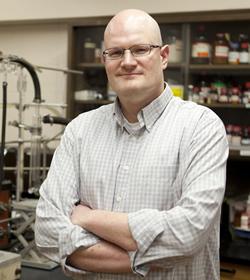
Dr. Greg Spivak is using chemistry to develop a unique line of anticancer drugs.
"While platinum metal drugs continue to occupy a prominent position in the arsenal of anticancer agents, they suffer from a number of drawbacks," explains Dr. Spivak. As such, there is a solid need for alternative, metal-based anticancer compounds without such adverse shortcomings as high toxicity and solubility. To meet this demand, his team is currently investigating the plausibility of ruthenium-based drugs.
Ruthenium in general has long intrigued Dr. Spivak. In addition to chemotherapeutic applications, his lab has investigated the organometallic and catalytic chemistry of the metal, among other platinum group elements. In particular, he's interested in the metal's form, through which the synthesis and application of unique phosphine ligands can be explored as well as the potential for "zwitterionic" or neutrally charged ruthenium catalysts.
Positively charged catalysts are popularly used in industry. However, compared with their neutral counterparts, these catalysts can exhibit a diminished performance potential which can interfere with solvent and substrate compatibility. "Alternatively, a charge-neutral approach would help circumvent these problems and could lead to more efficient catalysts and possibly new catalytic applications."
Tackling projects like these, Dr. Spivak's students have an opportunity to delve deep into a research project, learn new techniques, and collaborate with other researchers. As well, the marketable skills students are provided will allow for a smooth transition into industrial careers.
In addition, Dr. Spivak makes a true effort to promote intellectual independence and encourage his students to take advantage of the immediate knowledge base that surrounds them.
"Students working in my lab should expect to broaden and enhance their synthetic chemistry, communication, and critical analysis skills, and to function independently." Simultaneously, he encourages his students to appreciate the value of collaboration and interdisciplinary research.
Brad Doff
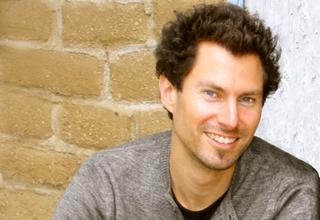
Geography student Bradley Doff is exploring the good of green. A master's student in environmental studies, he's researching how communities and cities can benefit from trees and other kinds of living green infrastructure.
"I'm looking at how we can better invest in the urban ecology of our communities so we can receive the biggest payback."
Doff has always had a passion for community sustainability. After years of employment in the field of urban forestry, he was prompted to pursue graduate studies when he discovered a large void in the models and knowledge available to his fellow professionals. "This lack in science drove me to return to school in order to develop a research model that would provide a meaningful approach to using green infrastructure as biotechnology in cities."
What with the high demand for green ideas and products at present, his research has enjoyed international popularity. Doff has travelled to locations such as Halifax, Milwaukee, and Toronto to speak at conferences and recently gave a presentation at TEDxThunderBay. He also volunteered his time at the international Making Cities' Livable conference in Charleston, South Carolina.
In terms of his future aspirations, Doff is already putting his education into practice. Using the model he designed in grad school, he's developing his own consulting company called SMARTGreening, which will help municipalities to achieve sustainability goals through strategic urban forest investments.
He largely attributes his success to Lakehead's dedicated faculty and staff. "The support and encouragement from Grad Studies in combination with our young and dynamic faculty cultivated an academic environment that was challenging, stimulating and supportive."
Chris Jones
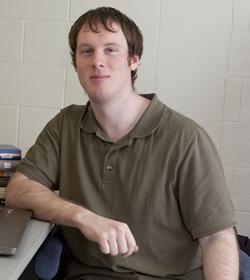
Chris Jones is quite content with the life of a sociology graduate student.
"It may sound boring, but sitting in my office reading through articles on a great topic has been one of my most rewarding experiences."
Jones was initially drawn to sociology because it offered a blend of the liberal arts with a highly valuable skill set that can be aptly applied in the community. Taking his studies to the graduate level, Jones has enjoyed the freedom to explore human behavior and society problems from multiple perspectives as well as opportunities to practically employ his education.
He's currently researching the effects of resource dependence on community development in the Yukon. Jones explains how rural communities throughout the territory tend to build their economies around natural resource industries, a strategy which has led to prosperity, but only for a fixed length of time.
"When markets shift or resource stocks diminish, communities are faced with underdevelopment," he explains. Therefore, a failure to develop in other ways can severely harm communities when the market for their chief exports turns sour. However, some researchers have recently claimed that several regions have adopted a more well-rounded phase of development, which lessens their economic dependence on natural resources. Jones is inquiring whether or not this is true of a community in the Yukon and adds that this project has offered him a wonderful opportunity to contribute to a project with real-world implications.
While undertaking his research, Jones has enjoyed employment both as a research assistant and graduate assistant. Through these well-paid positions, he's had a variety of experiences from running tutorials to tackling a project on Arctic sustainability, which will require him to travel to Iqualuit later this summer.
Though considering PhD studies following graduation, Jones is also tempted to jump into the workforce and find employment with a non-profit organization. He adds that he might not necessarily have to travel far to find a job: "Thunder Bay is a great city to live in if you're an aspiring sociologist. The region has a number of social issues, so there is definitely a need for good researchers. Plus, it's a great place to live in if you enjoy the outdoors - plenty of hunting and fishing!"

